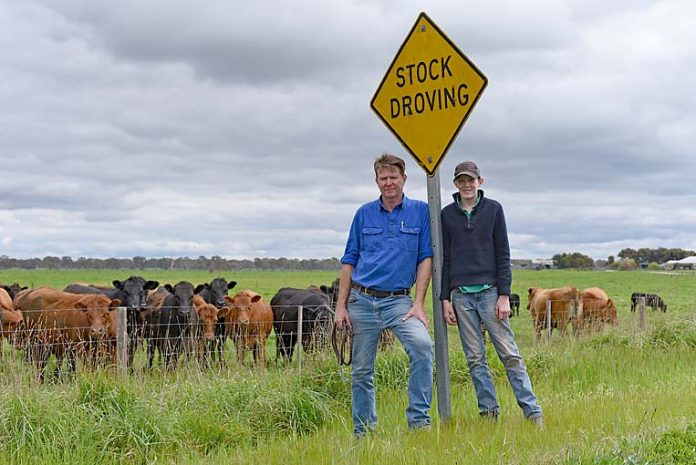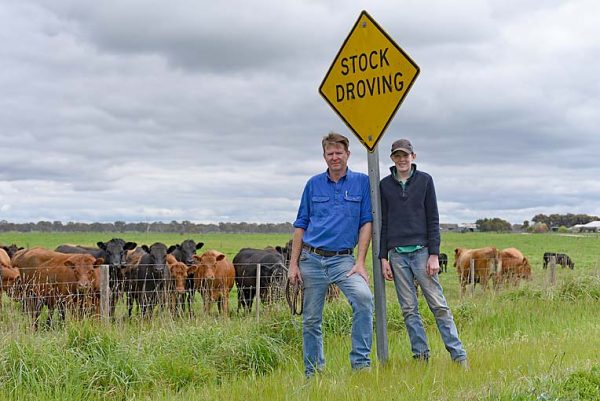

A LACK of Wattle Range Council resources has been attributed as a factor behind the decision to deny New South Wales farmer Gavin Stuckey a droving application earlier this year.
The cattle farmer came to the Limestone Coast last year in a final bid to save his 500 shorthorn cattle following devastating drought conditions at home.
The farmer travelled around 1000km in a final attempt to rescue his stock from what he described as “moon like” conditions at his Condoblin farm.
After droving around the Glenelg Shire Council area, Mr Stuckey travelled to the Penola district to further feed his cattle as he anxiously waits out the drought.
Mr Stuckey applied for a droving permit with Wattle Range Council in July this year, only to be turned down due to council’s “inexperience” and “lack of resources”.
Describing the situation as “disappointing” Mr Stuckey said he had planned to drove his cattle in the region, which would allow the animals to feed on roadside grass for a long period of time.
“It will make things much more manageable for me in a difficult time to be able to put my cattle on the road,” he said.
“I have been given the software and the maps so I know where the natural vegetation is and I know where to put up my tapes to prevent the cattle from damaging the under story and protect any native vegetation on the roads.
“I am extremely frustrated at the moment that council will not issue a permit and when I ask why the most notable answer I receive is they are inexperienced.”
Mr Stuckey said droving on roadsides provided benefits to the community, including reducing fire hazards.
“We are able to move the cattle wherever we like and keep them in a spot for as long as we want with electric tapes and the cattle are also very quiet,” he said.
“It is just inconvenient for a few people but what we usually find is that when we are working on the road we meet a lot of the locals because they stop and talk to us.”
The farmer said motorists who do stop “bend over backwards” to help once they realise the hardship he has endured.
“Council has in lieu provided me with a list of contacts and have made a few press releases but it is just not practical,” Mr Stuckey said.
“They are my cows and not anyone else’s problem.”
Wattle Range Council chief executive Ben Gower confirmed council rejected Mr Stuckey’s permit because of a lack of resources and other complications.
“We received an application a while back from Mr Stuckey and it was to drove a significant portion of council area,” he said.
“The original application was short and drove up to 500 cattle to around 50pc of council area.
“We then began researching into what we needed to do to make that happen and spoke to a range of agencies before realising it was more complicated than we first thought.”
“These included the fact that council would need a pic to track where the animals are located for biosecurity reasons and having to continuously converse with Mr Stuckey about where council has sprayed herbicides, which is something we commonly do.”
“This is because we cannot let anyone drove their livestock within seven days of spraying.”
Mr Gower attributed staffing numbers as another contributing factor to Mr Stuckey’s rejection.
“We only have one general inspector for the Wattle Range Council,” he said.
“We do not have the capacity, the experience, expertise or the horsepower to manage this situation at the moment.
“Council cannot justify the process and policy for just one application but we are sympathetic to Mr Stuckey’s situation and wish to help by finding him some land to graze on.”
Mr Gower said council would prefer to consult with the wider farming community before forming a long-term policy on droving.
“We would not want to approve the policy and receive backlash from the farming community on these issues,” he said.
“In other states there are dedicated droving roads but we do not have that here in South Australia.
“Council could not find any routes for droving here during their research.”
Mr Gower said council has put out media releases and made contact with Wattle Range ratepayers in an attempt to help Mr Stuckey.
“We have left it with them to make those arrangements but we have put them in contact to try and help him out,”
“Although there are stock droving signs around the region, they are mainly warning signs for motorists to keep an eye out for farmers moving their stock from one paddock to another.”
Mr Stuckey is currently leasing out a paddock west of Naracoorte but he said he is “buying time” until he runs out of feed once again.
Anyone able to help Mr Stuckey can contact him at gstuckey@bigpond.com or on 0429 952 502.







